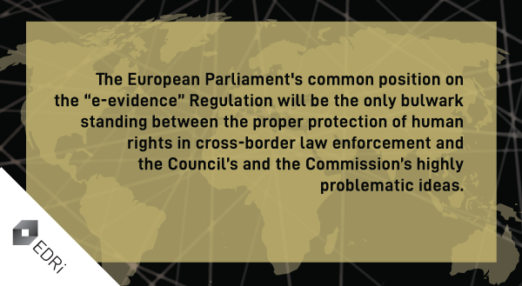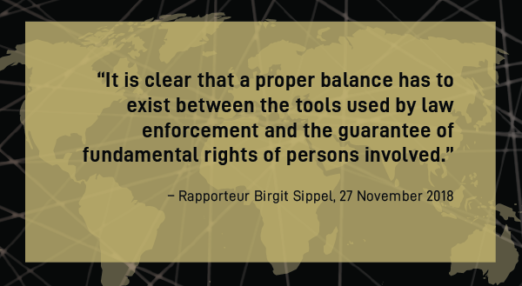cross border
Filter by...
-

Accountable Migration Tech: Transparency, governance and oversight
Migration continues to dominate headlines around the world. For example, given the currently deteriorating situation at the border between Greece and Turkey, with reports of increasingly repressive measures to turn people away, new technologies already play a part in border surveillance and decision-making at the border.
Read more
-

E-evidence and human rights: The Parliament is not quite there yet
The European Parliament Committee on Civil Liberties (LIBE) is currently busy working out a compromise between its different political groups in order to establish a common position on the “e-evidence” Regulation.
Read more
-

Click here to allow notifications in cross-border access to data
From a fundamental rights perspective, it’s essential that the proposal enabling cross-border access to data for criminal proceedings (“e-evidence”) includes a notification mechanism. However, this requirement of a notification seems to be out of the question for those advocating for “efficiency” of cross-border criminal investigations, even if that means abandoning the most basic procedural safeguards […]
Read more
-

Double legality check in e-evidence: Bye bye “direct data requests”
After having tabled some 600 additional amendments, members of the European Parliament Committee on Civil Liberties (LIBE) are still discussing the conditions under which law enforcement authorities in the EU should access data for their criminal investigations in cross-border cases. One of the key areas of debate is the involvement of a second authority in […]
Read more
-

“E-evidence”: Repairing the unrepairable
On 11 November 2019, Member of the European Parliament (MEP) Birgit Sippel (S&D), Rapporteur for the Committee on Civil Liberties, Justice and Home Affairs (LIBE) presented her draft Report, attempting to fix the many flaws of the European Commission’s “e-evidence” proposal. Has Sippel MEP been successful at repairing the unrepairable? The initial e-evidence proposal by […]
Read more
-

Cross-border access to data for law enforcement: Document pool
The European Commission proposed a Regulation on cross-border access to and preservation of electronic data held by service providers and a Directive to require service providers to appoint a legal representative within the EU in April 2018. Since then, the legislative process to adopt them has been fast-tracked, which has prevented any proper assessment of […]
Read more
-

LIBE Committee analysis: Challenges of cross-border access to data
On 7 February, the European Parliament Committee on Civil Liberties, Justice and Home Affairs (LIBE) presented two new working documents analysing further the issue of cross-border access to data in criminal matters, also known as “e-evidence”.
Read more
-

EU Council’s general approach on “e-evidence”: From bad to worse
On 7 December 2018, the Justice and Home Affairs Council (JHA) adopted its general approach – a political agreement before entering into negotiations with the European Parliament – on the proposal for a Regulation on European Production and Preservation Orders in criminal matters. The initial proposals of the European Commission already raised concerns in terms […]
Read more
-

Growing concerns on “e-evidence”: Council publishes its draft general approach
On 30 November 2018, the Council of the European Union published a draft text for its general approach on the proposal for a regulation on European Production and Preservation Orders in criminal matters – also known as “e-evidence”. The text is to be adopted by EU Member States, represented in the Council.
Read more
-
No legal basis for transfer of passenger data
The agreement between the European Commission and U.S. authorities on the transmission of passenger name record data (PNR) has encountered fierce opposition during a public hearing at the European parliament. The agreement gives the U.S Customs on-line access to passenger name record data of all EU based airlines for flights that go to, from or […]
Read more
-
USA gets direct access to European passenger data
From 5 March onwards, USA officials will have direct electronic access to databases with EU passenger data. On 19 February, U.S. Deputy Customs Commissioner Douglas Browning and officials of the European Commission agreed to give the custom officials direct access to the personal data of passengers flying to, from and through the United States. These […]
Read more
